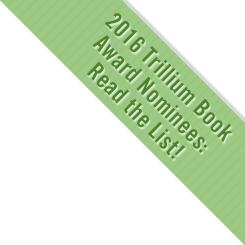You may have fond memories of Goodnight Moon or The Owl and the Pussycat, but now that you're a bit more world-weary, these tired children's classics may need a twist of bitters to make them palatable again. For a new take on children's verse — one that playfully exposes the conformist, patriarchal themes at work in the genre — don't miss Stephen Cain's new collection, I Can Say Interpellation, hot-of-the-press from BookThug and illustrated by our own Clelia Scala. (Click on the images below to enlarge this preview of her collages.)
Stephen and Clelia launch I Can Say Interpellation this Tuesday, May 24, at BookThug's BookLaunch at The Supermarket. Come out and celebrate the release of BookThug's fantastic spring list, including books by Jake Kennedy, Alessandro Porco, Aisha Sasha John, Richard Krueger, Gary Barwin and Gregory Betts, Phil Hall, Erín Moure and Niels Frank and Roger Greenwald. Visit our Events page for more details.
Open Book:
Can you describe an experience that you believe contributed to your becoming a poet?
Stephen Cain:
Probably my mother reading to me as a child; not just Dr. Seuss, but some classic narrative poems. I vividly remember the anthology Story Poems (which I’ve just googled to find that it’s a collection edited by Louis Untermeyer, former poet laureate of the U.S.) and my mother reading to me from it: Robert Service, Rudyard Kipling and anonymous ballads.
OB:
What is the first poem you remember being affected by?
SC:
Flipping through a general anthology of poetry in high school during the 1980s I came across “The Execution” by Alden Nowlan, and a few months later, when working at the Oshawa public library I stumbled upon “Secrets of the Universe” by David McFadden. Although written more than two decades apart from each other, they both explore similar terrain of mistaken identity and Twilight Zone–situations in a conversational style. They showed me what could be done, and what could be talked about, in a few concentrated lines. And, moreover, they both suggested a conversation that was going on that I wanted to be part of.
OB:
What one poem — from any time period — do you wish you had been the one to write?
SC:
Ah, a variation on the Desert Island Picks… at which I always cheat by selecting collected works and multi-volume texts.
So, I’ll say for this one bpNichol’s The Martyrology.
OB:
What has been your most unlikely source of inspiration?
SC:
1980s arcade video games.
OB:
What do you do with a poem that just isn't working?
SC:
The first thing I usually try to do is to cut out words. I find that there are few poems that I write that aren’t improved by becoming shorter. If it’s still not happening, then it gets shelved. Sometimes parts of it might be cannibalized years later for a new poem.
OB:
What was the last book of poetry you read that really knocked your socks off?
SC:
I’ve been mostly reading older poetry, and revisiting poetry collections that I’ve read before, but in the last few years I’ve enjoyed and admired Jordan Scott’s Blert (Coach House Books) and Sybil Unrest by Larissa Lai and Rita Wong (LINEBooks), both published in 2008.
OB:
What is the best thing about being a poet…and what is the worst?
SC:
The best part is being in a state of constant attention to language — listening to words and phrases that people say, and that one sees written all around, parsing and collecting language for future use as poems. The worst part is probably the same: you can spend so much time paying attention to the materiality of language that you consequently miss out on what’s really being said.
Stephen Cain is the author of I Can Say Interpellation (BookThug, 2011) and three earlier poetry collections — American Standard/ Canada Dry (Coach House, 2005), Torontology (ECW, 2001) and dyslexicon (Coach House, 1998). He has also composed a collaborative series of micro-fictions, Double Helix (Mercury, 2006), with Jay MillAr, and co-authored, with Tim Conley, The Encyclopedia of Fictional and Fantastic Languages (Greenwood, 2006). He lives in Toronto where has been a literary editor at the Queen Street Quarterly and fiction editor at Insomniac Press.
For more information about I Can Say Interpellation please visit the BookThug website.
Buy this book at your local independent bookstore or online at Chapters/Indigo or Amazon.
Find out what inspires, confounds and delights Canada's poets by following our Poets in Profile series.


Post new comment